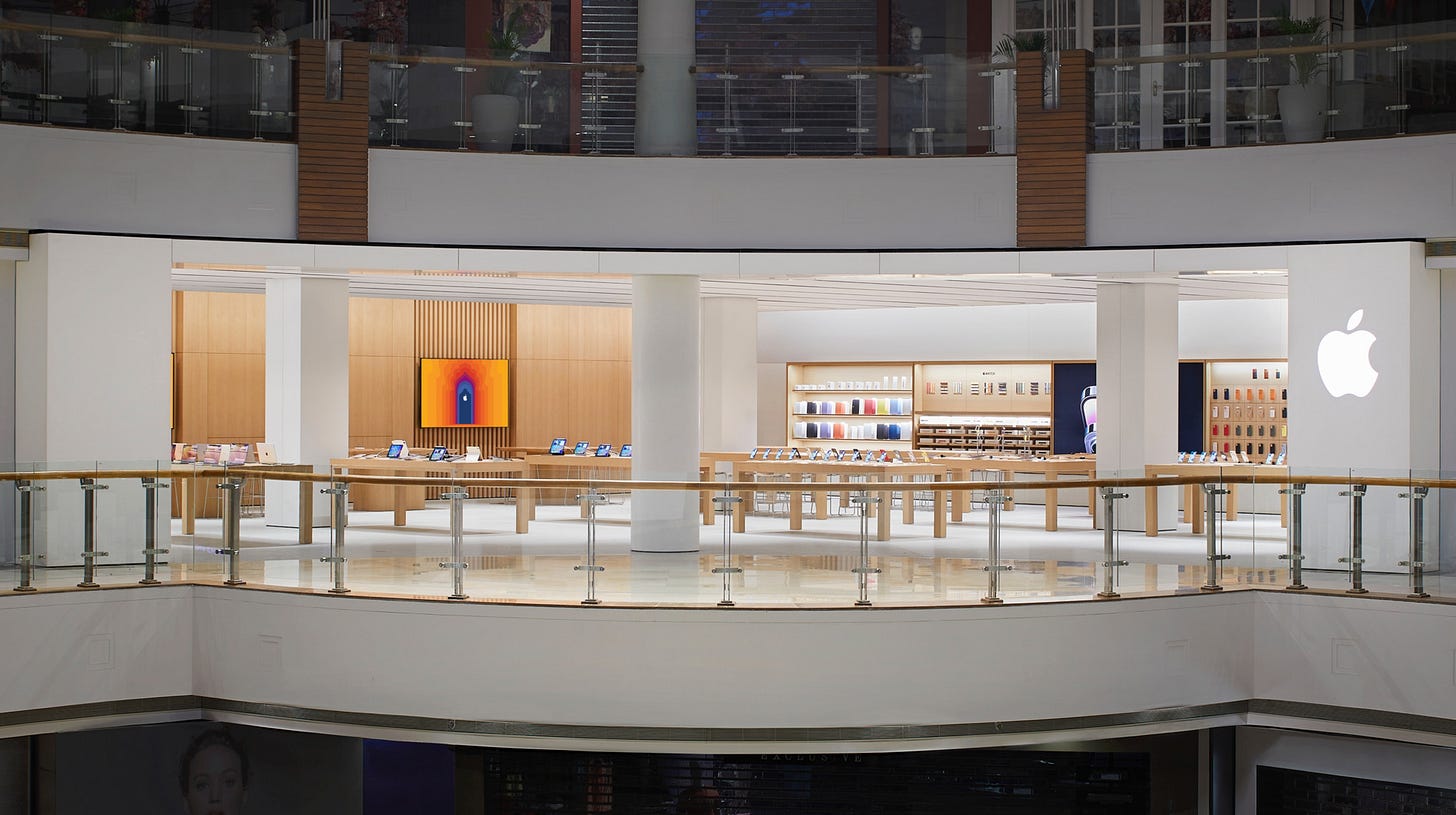No smoke without fire for ByteDance’s US struggles
Asia Tech Review: 8 May 2023
Welcome back,
This week we’re focusing on ByteDance, well it's TikTok’s business at least, which has been in the news with a number of big stories illustrating the huge financial returns at stake for its VC backers, alongside a peek into the data and security issues riddling it in the US.
Elsewhere, there’s reports of a planned US listing for Alibaba’s global e-commerce unit—which includes Lazada in Southeast Asia—and two big new funds closed in India. Also in India, there’s more clarity on how the state might investigate Byju’s and the country is the beachhead for Apple’s new push into emerging markets.
All that and more for this week.
See you again next Monday,
Jon
News in focus
US concern around ByteDance doesn’t come from nowhere
Investing in ByteDance, the world’s highest valued startup, will make the Chinese tech firm’s earliest backers rich beyond anyone’s wildest dreams. Sequoia China, General Atlantic and others are in line to make tens of billions—even at a lower valuation of $220B, as opposed to the previous $500B—but for one thing… nobody is sure when an exit will actually happen.
Forbes has a story on how the regulatory clouds are threatening to rain on the parade that would be one of the best exit events in the history of tech VC.
If it weren’t for the politics, another ByteDance investor recently told Forbes, investors would be happy to talk about a “monster” business primed for the public markets. The company took in about $80 billion in revenue and $25 billion in gross operating profit, numbers separately reported by The Information and The Economist in recent weeks and confirmed to Forbes by two sources. That would put it at roughly the same scale as Tencent, the public Chinese tech holding company that recently carried a market cap of about $470 billion. And it means that were ByteDance to go public, it would likely supplant Alibaba’s public offering, which raised $25 billion at a market cap of $231 billion in 2014, as the largest tech IPO ever.
The fact this potential exit could be so lucrative is a little staggering since Sequoia and others joined at Series C—not all that early, really—and ByteDance was already a known quantity in China, having developed the insanely popular/addictive news app Toutiao, which has struggled to go global the same way Douyin has found success with its international sibling TikTok.
But that’s really testament to just how big TikTok became in the US—where it has some 150 million users. That, though, has also bought problems around access to user data, the potential for spying, Chinese government interference, etc.
You’ve probably heard and seen these topics discussed at length on news channels, or even US politicians who grilled TikTok’s CEO. It’s easy to become blasé when the repetitive news cycle cannon is firing daily, but a couple of stories this week really do illustrate the fact that these concerns are real.
The Wall Street Journal reports that, for at least a year, some employees at TikTok were able to find what they described internally as a list of users who watch gay content on the popular app, a collection of information that sparked worker complaints link
Sure, this may not have been about ‘outing’ users—this is about making an app more engaging by knowing what people watch and like—but this information is highly sensitive and potentially dangerous in the wrong hands
An FT tech reporter outlined how TikTok had spied on her—seemingly accessing her account without permission, tracking location and trying to reverse engineer her sources—after she wrote articles deemed to be negative about the service link
The story shows there are some good folks at TikTok—sources who came forward to whistleblow on poor practices and a comms team member who told the reporter she’d had her account accessed—but again it’s the sheer amount of information with seemingly little limitations around access, usage, etc that worries.
TikTok’s US future is a political hot potato now, but in this case there’s no smoke without fire.
In lower profile but interesting news for ByteDance, Resso, its music streaming service for emerging markets, will go paid-only from May 11—tough to compete or this is supposed to be an add-on for the top-engaged users? Link
Alibaba making moves
There’s a fair bit happening at Alibaba after it made its significant announcement around breaking its business into units earlier this year:
Alibaba’s international online shopping arm is said to be exploring a US IPO. The unit, which includes Lazada and AliExpress, has been valued at as much as $39B by analysts link
Ant Group’s transformation into a fully regulated company has been held up by a reshuffle of China’s financial-regulatory system link
Alibaba founder Jack Ma has taken up a teaching post in Tokyo link
China
Huawei is leading a charge from China to file patents for essential technology that allows cars, mobile devices and other devices to access 4G, 5G and WiFi networks link
US microchip export controls imposed last year to freeze China's development of supercomputers appear to be having only minimal effects on China's tech sector link
Temu, the Shein-like e-commerce app from Chinese firm PDD, has opened an office to Dublin to accelerate its global push link
China may have reopened, but security visits to foreign firms have stoked concerns that Beijing is focusing on controlling information about markets and key financial link
China’s Censors are deleting videos about poverty—a taboo subject that Xi Jinping claims to have already defeated link
https://twitter.com/JChengWSJ/status/1654314722530054144
U.S. sanctions are spurring Chinese tech companies to accelerate research to develop cutting-edge artificial intelligence without relying on the latest American chips link
India
There’s more clarity on India’s plan to investigate Byju’s—the Directorate of Enforcement (ED) will reportedly seek details on transactions and loans from Byju’s banks and lenders are part of its deep dive. The edtech firm has grown like a weed but with controversy around how the company allegedly coaxes parents into expensive courses that are outside of their financial reach and requiring loans link
Apple is making a big play for future growth in emerging markets, starting with a major focus on India link
Cred is said to be raising $50-70M to push lending business link
3one4 Capital raised $200M for its fourth fund link
Chiratae Ventures, once the India arm of IDG, closed $122.5M for its first ever growth fund link
Airbnb boss Brian Chesky says India will be one of the company’s biggest growth markets this decade link
EV cab startup BluSmart raised $42M link
A fierce battle for AI talent is seeing salaries double in India link
Southeast Asia
Praktis raised $20M to help Indonesian D2C brands handle supply chains link
Taiwan
TSMC is said to be in talks with partners—including NXP and Infineon—to spend as much as €10B ($11B) to build a chip fabrication plant in Germany link
South Korea
Samsung banned the use of generative AI tools like ChatGPT after data the firm used in ChatGPT was leaked in April link
SK Hynix halted plans to upgrade chip tech at its Wuxi plant due to pressure from US sanctions on China link
Rest of Asia
Bhutan has been quietly mining Bitcoin for years—apparently since it was valued at $5,000 per bitcoin; the price is now around $30,000 link
Related to that, Bhutan is said to be planning a $500M crypto mining fund alongside crypto mining and management company Bitdeer link
Cyber-espionage campaigns are targeting military personnel in South Asia, according to research from Meta link
You just finished reading Asia Tech Review, the weekly newsletter for keeping up with the tech industry across Asia.
If someone sent this to you, you can sign up for free at Asiatechreview.com




hypothesis on the US stance on TikTok: banning it would be probably illegal -- so politicians are trying to just cast a cloud of doubt and potential future problems for the company, and with it limit its potential -- some kind of regulation by fear
what business is going to invest ad dollars in TikTok if it could get banned in six months? what creator would bet their career in that?
ByteDance would continue on this edge for years, making it less prone to take risks acquiring other companies or launching products, or going for moonshots that could make the company trillions in the long run.
For instance, there is no way ByteDance launches some of the software Alibaba, Baidu or Tencent have been doing for two decades, from web browsers to instant messaging, to videogames or even semiconductors.
You can clone chatGPT but over time it becomes increasingly difficult to clone TikTok.